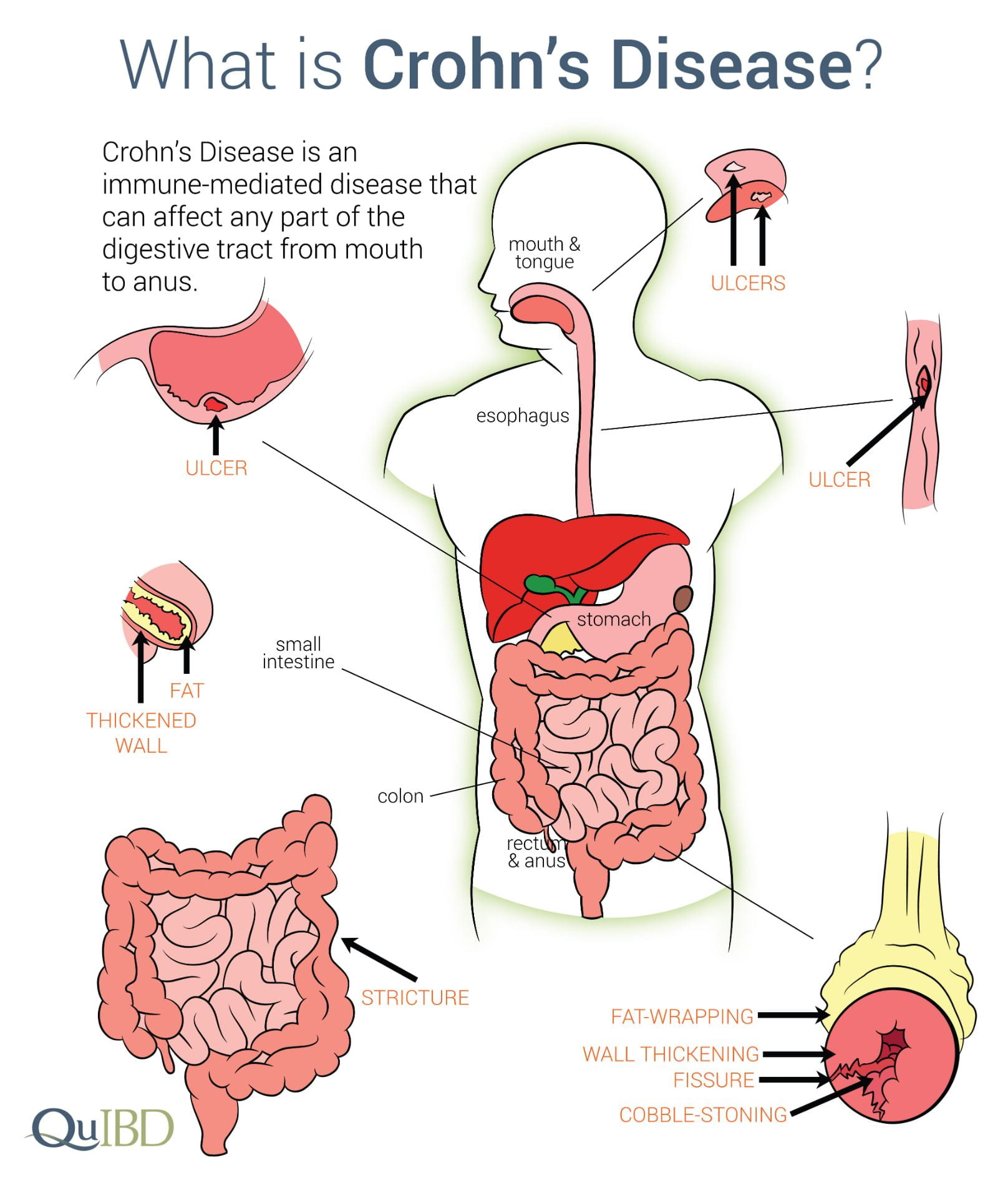
Definitions and Physiology of Crohn’s Disease
Crohn’s disease is a chronic inflammatory bowel disease that starts with crypt inflammations and abscesses, which then progress into tiny focal aphthous ulcers. Crohn’s disease typically begins between ages 15 and 40. It affects the distal ileum and colon and can occur in any part of the digestional tract. Transmural spread of the inflammation can lead to Lympedma (which is a lymphatic obstruction) and thickening of the bowel wall and mesenteries. Mesenteric fat typically extends onto the serosal surface (outer surface) of the bowel. Mesenteric lymph nodes often enlarge. Extensive inflammation can result in hypertrophy (which is an enlargement of an organ or tissue from an increase in the size of its cells) of the muscularis mucosae, fibrosis, and stricture formation, which can lead to bowel obstruction. Abscesses are common, and fistulas (which are abnormal connections between organs) often penetrate adjoining structures, including other loops of the bowel, the bladder, or psoas muscle. Fistulas may even extend to the skin of the anterior abdomen or flanks. Perianal fistulas and abscesses occur in 25 to 33% of cases and these complications are found to be the most troublesome aspects of Crohn’s disease. Crohn’s disease can be categorized into 3 main patterns: (1) primarily inflammatory, which after many years can then evolve into (2) primarily stenotic (narrowing) or obstructing, then finally (3) primarily penetrating or fistulizing.
- About 35% of Crohn’s disease cases involve the ileum alone.
- About 45% involve the ileum and colon, with a predilection for the right side of the colon.
- About 20% involve the colon alone
Symptoms of Crohn’s disease include diarrhea, weight loss, and abdominal pain. Extraintestinal symptoms, particularly arthritis may occur. Diagnosis is done by colonoscopy and imaging studies. Treatments include immunomodulators, corticosteroids, 5-aminosalicylic acid, antibiotics, anti-cytokines, and often surgery.
- https://www.niddk.nih.gov/health-information/digestive-diseases/crohns-disease/symptoms-causes
- https://www.health.harvard.edu/a_to_z/crohns-disease-a-to-z
- https://www.merckmanuals.com/professional/gastrointestinal-disorders/inflammatory-bowel-disease-ibd/crohn-disease
https://www.health.harvard.edu/a_to_z/crohns-disease-a-to-z
https://www.youtube.com/watch?v=jYmpIjciPig (an educational video about Crohn’s disease)
https://www.youtube.com/watch?v=FigkZ6qzRkQ (an educational video discussing sexuality and intimacy with Crohn’s disease)
Impact of Crohn’s Disease on Sexuality
Image: https://www.healthline.com/health/crohns-disease/sexual-health
Crohn’s disease is an inflammatory bowel disease that affects an individual’s overall well-being. While it primarily affects the gastrointestinal tract, a person with Crohn’s disease can have abdominal pain, fatigue, and mental health issues such as depression and anxiety as well (Crohn’s and Colitis UK, 2016). The majority of the population craves intimacy and affection as it is a basic human need. An individual with a chronic disease like Crohn’s disease can have their relationships and sexuality affected due to the symptoms associated with the illness.
The population with Crohn’s disease struggle with their body image and self-confidence due to fluctuating weight and scars from surgery. Sexual dysfunctions for both men and women are prominent with this illness due medications that have side effects of depression leading to erectile dysfunction and fear of rejection; it is not uncommon for people with an IBD to have depression, anxiety, and other feelings affecting their performance (Christensen, 2014). Also, an individual might find themselves in pain with Crohn’s disease, so they must be able to communicate with their partner effectively to address their concerns and find other ways to be intimate. Overall, people with Crohn’s disease can live a happy and healthy sexual life with their partner(s), but it requires playing an active role in taking their medication, managing their mental health, and communicating intimacy with their partner.
https://www.ncbi.nlm.nih.gov/pmc/articles/PMC4008960/
Youtube Link for Relationships with Crohn’s: https://www.youtube.com/watch?v=2VDzZc3KcUY&feature=emb_title
Interventions and Patient/Family Teaching
Crohn’s disease, as well as almost all chronic illnesses, can be fairly difficult to deal with for the family and the patient. However, early intervention and treatment are crucial to getting a head start on the disease. No single treatment works for everyone with this disease. Treatment is focused on the goal of decreasing inflammation in your intestines, preventing flare-ups of symptoms, and keeping the patient in remission (Treatment for Crohn’s, 2017). https://www.niddk.nih.gov/health-information/digestive-diseases/crohns-disease/treatment
There are many options for treatment for people suffering from Crohn’s. Anti-inflammatory drugs and immune system suppressors are often the first step after diagnosis which could include several medicines; corticosteroids, azathioprine, mercaptopurine, methotrexate, and oral 5-aminosalicylates are some of the main ones used. Other medications such as pain-killers, antidiarrheals, and vitamins and supplements may be needed as well. “If diet and lifestyle changes, drug therapy, or other treatments don’t relieve your signs and symptoms, your doctor may recommend surgery. Nearly half of those with Crohn’s disease will require at least one surgery. However, surgery does not cure Crohn’s disease. During surgery, your surgeon removes a damaged portion of your digestive tract and then reconnects the healthy sections. Surgery may also be used to close fistulas and drain abscesses (Crohn’s, 2020).” You can read more about the treatment process here: https://www.mayoclinic.org/diseases-conditions/crohns-disease/diagnosis-treatment/drc-20353309
Getting to the diagnosis of Crohn’s disease can be a long track for a lot of patients dealing with inflammatory bowel disease. This can lead to a rollercoaster of emotions for both the family and those with Crohn’s. I will link the Crohn’s Foundation website that has many resources to help you better understand the disease as a whole and where to go from there. https://www.crohnscolitisfoundation.org/what-is-crohns-disease Inflammatory Bowl disease affects more than 1.6 million Americans. Understanding the disease and getting the support that you need is essential.
Resources
Crohn’s disease. (2020, October 13). Retrieved November 21, 2020, from
https://www.mayoclinic.org/diseases-conditions/crohns-disease/diagnosis-treatment/drc-20353309
Treatment for Crohn’s Disease. (2017, September 01). Retrieved November 21, 2020, from
https://www.niddk.nih.gov/health-information/digestive-diseases/crohns-disease/treatment
Where to find support for Crohn’s disease and related sexual health concerns
IBD affects an estimated 3 million Americans. Crohn’s disease is most often diagnosed in adolescents and adults between the ages of 20 and 30. In IBD patients, more than 50% of women suffer from sexual dysfunction and 45% of men from erectile dysfunction (Leenhardt, 2019) Patients can find support for their medical concerns by asking their gastroenterologist or may seek to find a sex therapist that may offer guidance with sexual health concerns when dealing with Crohn’s disease.
Oftentimes, it can be hard to deal with Crohn’s disease alone. Luckily there are many options in looking for support groups for Crohn’s disease and any related sexual health concerns. There are numerous support groups, where patients and family members can connect to others living with these diseases. There’s a website that provides resources for patients called, “Crohn’s and Colitis Foundation”.
Crohn’s and Colitis Foundation is a non-profit, volunteer field organization dedicated to finding cures for Crohn’s disease and ulcerative colitis and improving the quality of life of children and adults affected by these diseases. This website provides all the information needed for the patient if they have any concerns with their disease and sexual health concerns. They provide support group information. If patients decide they prefer to do an in-person support group, they simply type in their state and zip code. The website will then provide multiple in-person support groups near your location. If patients decide they want to join an online support group, they can. Patients are also able to create or start a new support group where other patients share a common interest. The Crohn’s and Colitis Foundation also provides webinars or virtual events for IBD and sexual health. It educates patients on issues around sex and IBD. It also includes both intimacy and reproductive concerns for IBD patients. It is also hosted by the Doctor who is medically trained to provide information for patients.
- https://www.ncbi.nlm.nih.gov/pmc/articles/PMC6767981/#:~:text=In%20IBD%20patients%2C%20more%20than,sexual%20health%20in%20IBD%20patients.
- https://www.crohnscolitisfoundation.org/events/ibd-sexual-health-webinar
- https://www.crohnscolitisfoundation.org/community-support
- https://www.crohnscolitisfoundation.org/
Here are some local gastroenterology in Harrisonburg, VA:
- Sentara
Timothy C. Landes, M.D.
1871 Evelyn Byrd Ave
(540) 564 5800
- Shenandoah Valley Gastroenterology
Dr. Javier A. Pou, FACG
2706 Spotwood Trail
(540) 437 )087
The nearest support group by Harrisonburg:
- Crohn’s & Colitis Foundation Support Group:
Charlottesville, VA 22901
(301) 287 8494

